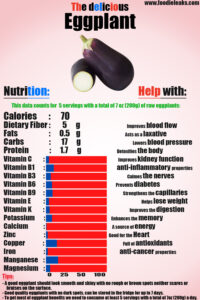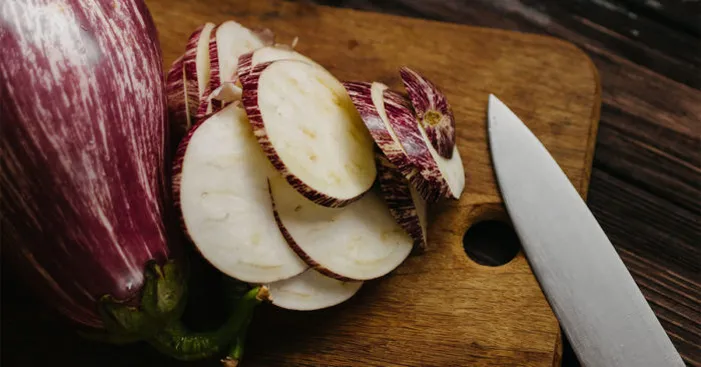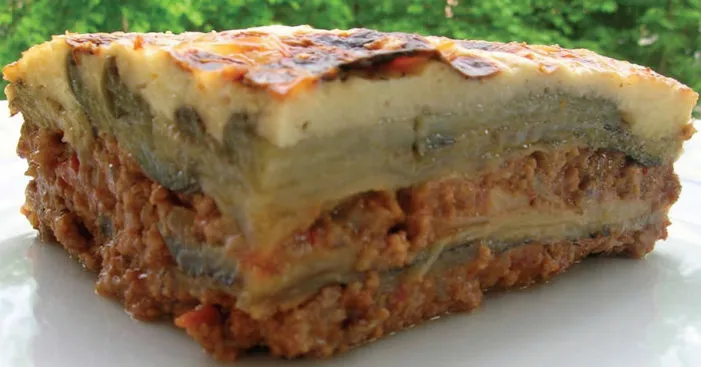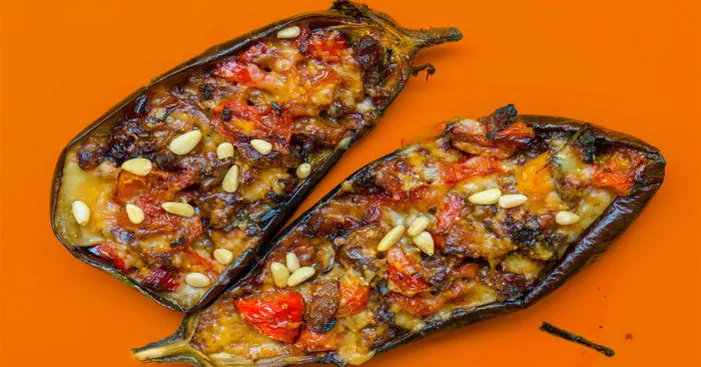Table of Contents

Eggplant carbs come from a combination of nutrients that gives it some very powerful antioxidant properties than benefit our health.
In this article, we gathered all the information you need to know about eggplant carbs, their health benefits and side effects, alongside tips on how to buy + cook + store eggplants.
But before we start, what are the different common types of eggplants?
Eggplant types:

White eggplant:
Even though not many people know about the white varieties of eggplants, they are becoming more and more popular in recent years.
White eggplants belong to the Dourga variety and resemble purple eggplants in size and shape.
This type of eggplant dissolves when cooked and adds a unique sweet flavor that is very well appreciated especially by those that don’t like bitterness.
Being the softest eggplant type, the white variety can fit in more recipes as it can totally dissolve and be part of a thick stew or sauce.
The white eggplants are mostly used in the famous Japanese tempura and other famous Asian recipes.
Purple eggplant:
This is the most classic type of eggplant and probably the only one most people know about.
With its long shape and beautiful deep purple color that sometimes looks black, purple eggplants have a strong and irresistible flavor that adds a unique touch to many recipes.
This type of eggplant is best-chosen half-ripe and that’s when they have the least amount of seeds.
When they are medium ripe, purple eggplants have smooth and shiny skin with no spots and very firm flesh that doesn’t dissolve when cooked.
Because it holds on to its structure even after cooking, this type of eggplant is very fit for gratins, ratatouilles, and tajines as they won’t end up mushy.
They are also perfect for stuffing as they offer both a solid structure and a strong unique flavor.
Striped eggplants:
The striped variety of eggplants is very eye-catching, however, they’re not very different from the purple eggplants in terms of taste and shape.
Sadly, the stripes disappear once they are cooked and they just become identical to the cooked purple eggplants.
Nonetheless, striped eggplants are not more expensive than the other varieties and they can surely add a special decoration touch to your dish when used raw.
Other exotic eggplants:
There are a few types of eggplants that are not known globally and they are often referred to as “Japanese eggplants” or “Chinese eggplant”.
These Chinese eggplants are thin and look like a long purple fruit with a sweet flavor and with not much flesh on the inside.
In addition, Thai eggplants are small and round and their size range from small peas to the size of a clementine.
However, you need to have some knowledge of Asian recipes before you use Thai eggplants as some of them can be really bitter and others can even be consumed raw.
Eggplant carbs and their health benefits:

Eggplant carbs:
Eggplants are a good source of carbohydrates minerals, vitamins, and other nutritional plant components.
Eggplants contain chlorogenic acid, a powerful antioxidant that protects the cells from the damage that can be caused by free radicals.
Also, it reduces bad cholesterol levels in the blood and acts as a muta-genic as it prevents tumor growth.
Another antioxidant in eggplants is nasunin which can reduce the blood flow to cancer cells by preventing the processes of angiogenesis.
Eggplant offers many vitamins including vitamin A, C, and B alongside minerals such as magnesium, potassium, phosphorus, and calcium.
The good thing about this vegetable is the good amount of dietary fibers with little to no fat content.
This data counts for the recommended 5 servings with a total of 7 oz (200g) of raw eggplants:

- Calorie: 70
- Fibers: 5 g
- Fats: 0.5 g
- Crabs: 17 g
- Protein: 1.7 g
- C vitamin: 5%
- B1 vitamin: 13%
- B3 vitamin: 8%
- B6 vitamin: 10%
- B9 vitamin: 11%
- E vitamin: 5%
- K vitamin: 6%
- Potassium: 10%
- Calcium: 1%
- Zinc: 3%
- Copper: 18%
- Iron: 3%
- Manganese: 20%
- Magnesium: 7%
Health benefits:

Anti-cancer properties:
Eggplant carbs offer several substances that have the potential to fight cancer cells.
For instance, eggplants contain solasodine rhamnosyl glycosides (SRG) which is a plant compound proven to have anti-cancer properties.
Many animal studies on SRG show great results, especially in the case of skin cancer.
Also, more than 200 studies found that consuming vegetables and fruits such as eggplants can reduce the risk of cancer.
However, eggplants are definitely not a cure for cancer but they certainly have good anti-cancer abilities that can be a great ally during treatments.
Full of antioxidants:
This vegetable is a source of many antioxidants that have great abilities to fight free radicals the source of most diseases.
The purple color on the skin of eggplants comes from the presence of anthocyanins that can protect brain cells and prevent memory loss.
The skin of eggplants also contains Nasunin which can counter the effect of aging and prevent cognitive impairment.
To get the most antioxidants from eggplants it is best to consume them with their skin on.
Good for the heart:
Eggplant carbs are a source of potassium, anthocyanins, dietary fibers, and vitamin B6 which are all good for the heart.
Some animal studies suggest that once rabbits consumed eggplants daily for two weeks they had a good drop in cholesterol levels which prevents heart disease.
Other studies confirm the heart-protective effect of eggplants in animals as they had a more optimal heart functioning.
Nonetheless, more studies need to be done on humans to confirm these results but for the moment, the nutrients in eggplants can only benefit the heart.
A source of energy:
With good amounts of vitamin B1, B3, B6, and B9, eggplant carbs will help you stay fit and boost your overall metabolism.
These nutrients in eggplant carbs will also help convert the food you eat into energy that you can use for physical activities.
For instance, vitamin B6 is essential for creating amino acids which are needed to stay in shape and fight inflammation or chronic fatigue.
On the other hand, with 10% of the daily need for vitamin B6 eating eggplants will help in the formation of red blood cells and neurotransmitters.
Consequently, the body cells end up being better oxygenated and that would promote better functioning throughout the body.
Enhances the memory:
Consuming eggplants regularly may as well enhance memory because it contains Iron, Zinc, vitamin C, vitamin K, and Vitamin B9.
These nutrients are all beneficial for mental health as they can relieve depression and increase brain capacity.
In fact, human memory is tightly linked to brain capacity and this is how eggplants can indirectly benefit memory.
Improves digestion:
Almost 90% of eggplant is water and this explains why they have a very low caloric value.
Consuming the recommended dose of servings of eggplants (7oz, 200g) would offer about 25% of the daily need in fibers.
This would help the body lose waste faster and therefore remove possible toxins that can cause stomachache.
Also, thanks to the high water content of eggplants consuming them will ensure that the digestive tract is well hydrated which promotes better defecation.
Because of that, eggplants are among the ingredients of a GAPS diet which is designed to promote better digestion.
Other benefits of eggplant carbs:
- Improves blood flow.
- Acts as a laxative.
- Lowers blood pressure.
- Detoxifies the body.
- Improves kidney function.
- Offers anti-inflammatory properties.
- Calms the nerves.
- Prevents diabetes.
- Contributes to brain development.
- Strengthens the capillaries.
- Helps lose weight.
Precautions before you consume eggplant carbs:

High in oxalic acid:
Eggplant carbs contain oxalic acid which is generally linked to an increased risk of developing kidney stones.
Therefore, some people should avoid consuming eggplant carbs especially if they had suffered from kidney stones or arthritis before.
A nightshade vegetable:
Eggplants are among the nightshade family (known as “Solanaceae “) alongside tomatoes, potatoes, and peppers.
For some people, the consumption of such vegetables may cause some side effects and allergic reactions.
Nicotine content:
In research made by the New England Journal of Medicine in 1993, it was reported that eggplants have the most nicotine content in comparison to other vegetables.
Also, it was published in the New York Times that eggplants contain nicotinic acid which is very similar in structure to nicotine.
Even though nicotinic acid is not the same as nicotine, it is the component responsible for the Niacin content of eggplants.
Allergic reactions:
According to research done by the Indian Central Food Research Institute, eggplants may cause some allergic reactions.
The symptoms of these allergic reactions can be:
- Swelling of the tongue and lips.
- Vomiting and Nausea.
- Itching and rash.
These reactions are usually mild, however, parents should avoid introducing eggplants to their kids if they already have allergies.
Consuming eggplant carbs:

Eggplants are one of the main ingredients, especially in middle eastern and Mediterranean cuisines.
This is because such dishes require a strong flavor and are based on the different textures of various fruits and vegetables.
In addition, eggplant flavor blends well with olive oil and strong spices.
People like to consume eggplant carbs as part of an appetizer or a side dish.
To do that, you can simply slice eggplants then grill them in the oven or fry them then serve them with fish or meat.
Eggplants are one of the main ingredients of the famous Moussaka dish, a flavorful dish from the Middle East.
On the other hand, Italians like to add chopped eggplants to lasagna alongside mozzarella and tomato sauce.
Eggplants in the oven:

Ingredients:
- 200 g of eggplants (7 ounces or half an eggplant).
- 2 onions.
- 4 garlic cloves.
- 4 tomatoes.
- 2 green peppers.
- 5 tbsp of cheese (Parmesan).
- 2 ounces of cantaloupe (55g).
- 1 egg.
- 4 slices of wheat toast.
- 2 tbsp of olive oil.
- Salt and pepper.
Preparation:
- Start by heating the oven to 400°F (200°C).
- Cut the eggplant and cantaloupe into slices then cut the tomatoes into circles.
- Heat the olive oil in a frying pan, then start frying the eggplants with cantaloupe and tomatoes for 10 minutes while stirring once in a while.
- In the meanwhile, get an oven tray and cover it with a layer of wheat toast slices.
- Now add the fried slices of eggplants, cantaloupe, and tomatoes along with chopped onion, garlic, and green pepper.
- Put the raw egg on top then season the tray with olive oil, Camembert cheese, salt, and pepper then place the tray in the oven.
- Let it cook for 25 minutes before you take it out and let it cool down.
- Serve it to up to 5 people and enjoy it!
Moussaka:

Ingredients:
- 2 Eggplants.
- 1 lb of Ground beef (450g).
- 1 chopped onion.
- 6 Potatoes.
- 5 chopped tomatoes.
- 2 tbsp olive oil.
- 1.5 cups of milk.
- 5 tbsps of butter.
- 1 tsp of cinnamon powder.
- 1 tbsp of Honey.
- Salt & pepper.
Preparation:
- Heat olive oil in a pot then cook the onions until they become soft and golden.
- Now add tomatoes, honey, cinnamon, and salt and let them cook over medium heat 350°F (175°C) for 20 minutes, then let them rest.
- Cut the eggplants into circles then season them with a bit of salt and let them rest.
- Peel the potatoes and cut them into thick slices.
- On a tray, put 3 tbsp of olive oil then add the slices of potatoes with 3 tablespoons of the tomato sauce you made earlier.
- Place the tray in the oven and cook the potatoes until they brown (10 minutes on 350°F/175°C).
- Take the tray of potatoes off the oven and start toasting the eggplant circles in an oiled frying pan for 5 minutes on each side then turn off the heat and let them rest.
- In another casserole, melt the butter over the high heat of 400°F (200°C) then brown the ground beef with salt and pepper while simmering.
- Now add the remaining tomato sauce and mix the ingredients, cover the casserole and turn down the heat to 120°F (50°C) and let it cook.
Preparing the béchamel sauce:
- Using another pan, melt 2 tbsps of butter then add 3 tbsps of flour and cook them for 5 minutes.
- Now gradually add milk while stirring, it should take 10 minutes to obtain a thick béchamel sauce.
- Season the béchamel sauce with salt and pepper and mix the béchamel sauce until it becomes homogenous.
Assembling the ingredients:
- Preheat the oven to 400°F (200°C).
- Get the potatoes tray, and start putting a layer of fried eggplants evenly spread, then a layer of ground beef sauce, again a layer of eggplants, a layer of beef sauce, and repeat the process.
- Use the béchamel sauce as a final layer to cover the whole tray.
- Now put the tray in the oven at 400°F (200°C) and let it cook for 1 hour until the béchamel looks golden and becomes crispy.
- Serve this delicious moussaka portions to up to 5 people, enjoy it!
Stuffed eggplants:

Ingredients:
- 5 eggplants.
- 1lb ground beef
- 2 chopped tomatoes.
- 1 chopped Onion.
- 5 chopped garlic cloves.
- 2 cloves of garlic
- 2 eggs.
- ½ cup of Grated Parmesan cheese (2 ounces, 55g)
- 4 tbsps of olive oil.
- Salt and pepper.
- 1 sprig of basil and 1 sprig of parsley (about 4 leaves each).
Preparation:
- Cut 4 eggplants in half lengthwise.
- Now put 2 tbsps of olive oil on the surface of an oven tray, then place the halves of eggplants and bake them in the oven for 30 minutes over 350°F (175°C).
- Now chop the remaining eggplant into small fine pieces.
- Heat 2 tbsps of olive oil in a frying pan then add onion, tomatoes, garlic, chopped eggplants, salt, pepper, and ground beef let them cook for 15 minutes while stirring.
- Turn off the heat and add chopped parsley, basil, and beaten eggs with Parmesan then mix all the ingredients in the frying pan.
- Now use the mixture as a filling on top of each eggplant half.
- Place the tray in the oven again and cook for 10 minutes over 400°F (200°C).
- That’s it, let them cool down and enjoy them!
Buying eggplants:

The first thing you need to know is that eggplant comes in different shapes and sizes.
In terms of size, they can be large, fat, small, skinny, or round as for the color they can be purple, striped, or even white.
Nonetheless, regardless of the type of eggplant, you’re buying you should always look for the ones with firm skin and a little pressure resistance.
If you notice any softness when you apply gentle pressure, it is a sign that the eggplant is overripe and can taste a bit bitter.
Even though, you can cut around the soft parts and safely consume the rest however you would be losing some of the vegetables and you should buy them for a cheaper price.
A good eggplant should look smooth and shiny with no rough or brown spots or scars or bruises on the surface.
Finally, fresh eggplants should have their stalk intact and not start to peel off.
Storing eggplants:

Eggplants come in summer but with modern agriculture, you can still find them throughout the year.
The natural peak season of eggplants is between June and August when the vegetable is the fleshiest and tastiest.
If you buy good quality eggplants with no dark spots, you can store them in the fridge for up to 7 days.
You should never keep eggplants at room temperature as they spoil so fast within a day or two.
Also, most vegetables are better stored when we cover them in a plastic bag before we put them in the fridge.
This is not the case for eggplants as you should never cover them with a plastic bag since they can chemically interact with plastic material and go rancid.
In case you want to freeze eggplants, it is recommended to steam them and then slice them before you place them on a flat plate and in the freezer for up to 8 months.
Among the traditional ways of conservation, people marinate eggplant slices in olive oil or lemon juice and store them in a glass jar in the fridge for 2 months.
The pickled eggplants are very tasty and would make a very delicious appetizer that requires no preparation.
